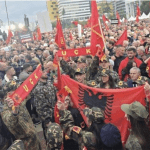TIRANA, Sept. 24 – One of the main topics of interest that came out after an hour long speech with all the government successes in one year from Prime Minister Sali Berisha on Sunday was his attack against Serbia’s opposition to Kosova’s independence which he called as unrealistic. Berisha suggested the international community may have to impose a solution to resolve the disputed province’s status. Berisha said the Serbian opposition must not be allowed to stand in the way of a settlement. Kosova is entering the final phase of U.N.-brokered talks that many believe will give it independence from Serbia. Ethnic Albanians, who make up 90 percent of Kosova’s 2 million people, are seeking independence. Serbs are willing to grant the province broad autonomy, but they see it as the heart of their ancient homeland and want it to remain a part of Serbian territory. “I believe Belgrade continues to take an unrealistic stand on Kosova’s status but that lack of realism should not hamper the final solution,” Berisha told the news conference. The prime minister said a consensus between the two sides was preferable, but suggested the international community may have to impose a solution. “In the Balkans’ 150-year history all deals have been imposed. Let this (on Kosova) be the last and the others be achieved with consensus and good understanding in a democratic Balkans, integrated into Europe,” he said. Albania has been the biggest supporter for Kosova’s independence, leading to frosty relations with Serbia. Tirana has, however, always said it has no territorial claims and does not intend to change its border. “Albania considers the resolution of Kosova’s status, and this country’s independence, as vital for Balkans’ peace and stability, in accordance with the full guarantee of freedom and rights of Kosova minorities and citizens,” said Berisha. The chief U.N. envoy for Kosova Maarti Ahtisaari told the U.N. General Assembly last week that time was short on U.N.-brokered efforts to determine the province’s future stat us but that he had no “fixed deadlines.” The six major powers guiding the Kosova talks have given U.N. negotiator Martti Ahtisaari a green light to propose his own settlement proposal and try to resolve the status of the Serbian province by the end of the year. Nearly seven months of U.N. negotiations in Vienna have failed to bridge the gap between Serbs who oppose independence and the Kosova Albanians who insist on it.
Serbian Foreign Minister Vuk Draskovic told the Pristina newspaper Epoka e Re that independence for Kosova without Serb approval could spark trouble not only in Kosova but in neighboring Bosnia, Montenegro and Macedonia. Draskovic says Kosova is a spiritual as well as a territorial issue for Serbs. Although Kosova has held an important symbolic place for Serbs since the middle ages, the province today has a 90-percent ethnic-Albanian population. Ahtisaari may likely propose some form of conditional independence for Kosova with strong safeguards for the Serb minority. Government spokesmen in Belgrade have repeated their complaint that Ahtisaari is biased in favor of the Albanians and should resign his position. Ahtisaari has said that while he has no fixed deadline he does intend to move ahead swiftly. He says that if Kosova does become independent it would not set a precedent for other nations. Russia, a member of the six nation Contact Group, has said that if Kosova is permitted to secede from Serbia, that would be a precedent that could apply elsewhere.
Berisha attacks Serbia’s opposition to Kosova independence as ‘unrealistic’

Change font size:









